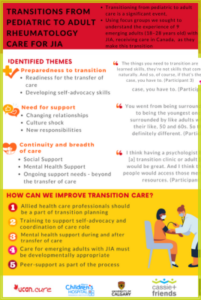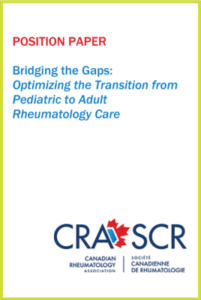Preparing for the Transition from Pediatric to Adult Care and Beyond
A new, adult-focused care team. Beginning University. Moving. Travelling. Work. Relationships. Navigating social settings.
These are big topics can and they can be overwhelming! Our resources below can help you and your family prepare to ease into young adulthood, help teens gain independence and take control of their health journey, and answer questions that are sometimes hard to ask.
Remember, it’s never too early to begin preparing kids to play an active role in their health, especially when diagnosed with a childhood rheumatic disease.

Hear Directly from Experts and Youth
Beyond Transition: Easing into Young Adulthood with Childhood Rheumatic Disease
Our Beyond Transition webinar covered topics that might be difficult or tricky for you to talk to your teen about or our often shied away from. With the help of Adolescent Medicine Specialist, Dr. Andrea Wallace, the JIA Transition Team out of Toronto, Pediatric Rheumatologist Michelle Batthish of McMaster Hospital and our youth speaker, Trish Peters, we dove head first into a frank and open conversation about life after high school (university, work, travel), relationships and sexual health, and even the impact of alcohol and drug use on medication and JA symptoms.
Écoutez l’enregistrement du webinaire en Français ici
Continuing learning with more webinars covering the ins and outs of growing up and growing with JA and other rheumatic diseases.
C+F Virtual Youth Panel
You’ll hear real stories from young adults about how rheumatic diseases affected them at school, sports, and with friends, and learn more about ways to help your child/teen cope with pain, treatments, and emotions.
This discussion is beneficial for parents, affected youth, grandparents/family members, healthcare professionals, educators, coaches and anyone who wants to learn more about what it’s like to be diagnosed with a rheumatic disease and navigate its treatments, symptoms, challenges and lessons.
Learn more about these amazing youth, access time stamps and Q+As, and watch the recording here.
Taking the Reins Webinar
‘Taking the Reins’ touches on transition principles (such as the three-sentence tool) and coaches families on when the best time might be to get children more involved with managing their pediatric rheumatic disease.
You’ll hear directly from young adults with lived experience on how they gained independence in areas such as:
- self-advocacy
- coordinating appointments and insurance
- balancing school, work, and their overall health
- moving away from home
- and the support they needed to thrive
Écoutez l’enregistrement du webinaire en Français ici.
Need Support Getting Started with Self-Injections?
Young adult patient, Julie Beausoleil, has been doing self-injections with her JIA medication since she was in her early teens.
In this video, she walks us through her at-home injection routine and shares some helpful tips when it comes to preparing yourself for your medication.
Looking for more information about injections? Check out our Injection Support page here.
Beyond Transition: Advocating for Your Rheumatic Disease Needs in the Workplace
In collaboration with the Institute of Work and Health, JIA Transition Clinic at Women’s College Hospital, Toronto and young adults with lived experience, this webinar aims to help you know your rights at work, and feel empowered to advocate for your health needs in the workplace.
Click HERE for more information about Rheumatic Diseases in the Workplace.
2:50 – Warm Welcome from Executive Director, Jennifer Wilson
7:30 – Dr. Natasha Gakhal & Dr. Evelyn Rozenblyum on transitioning from pediatric to adult care
25:47 – Alison Legge shares her story about navigating the workplace as a young woman with JA, providing valuable information and advice
45:48 – Arif Jetha from the Institute for Work and Health discusses the impacts of rheumatic diseases at work and provides tools to support those with complex health needs in the workplace
1:02:53 – Saneliso Moyo, Labour Lawyer and Partner at Goldblatt Partners LLP, provides a legal perspective to help you know your rights in the workplace
1:20:01 – Commentary on Saneliso Moyo’s presentation Executive Director, Jennifer Wilson
1:22:44 – Q&A Question #1: Is there a name or a way to distinguish between people who grew up with arthritis as opposed to those who get these conditions as adults?
1:24:46 – Alison Legge discusses her experience disclosing her JA to her employers
1:25:45 – Arif Jetha on accommodations and disclosure
1:26:48 – Saneliso Moyo on documentation to support accommodation requests
1:29:44 – Dr. Natasha Gakhal on physician’s notes and the importance of the patient making the ask
1:31:14 – Dr. Evelyn Rozenblyum on physician’s notes for schools and higher education institutions
1:32:13 – Alison Legge on her move from Canada to the US and how US healthcare worked for her
1:33:38 – Saneliso Moyo answers question about disclosing medical appointments to employers
1:33:55 – Arif Jetha answers question on what types of jobs are good for people with rheumatic diseases to pursue
1:37:00 – Closing Remarks from Executive Director, Jennifer Wilson



Additional Resources Provided by Healthcare Teams
For Parents
-
- Parent/Caregiver Reference Guide: This all-encompassing guidebook created by McMaster Children’s Hospital (but applicable to everyone) assists parents and caregivers in understanding the importance of a transition process, the differences between pediatric and adult rheumatology care, and the role they play in supporting their teen’s transition.
-
- Health Care Transition Timeline for Parents/Caregivers + Readiness Assessments: This tool by Got Transition provides Parents/Caregivers with age-based stages (ages 12-25) to guide transition preparation. Parent and youth readiness assessments are also linked at the bottom of the page.
For Healthcare Teams
-
Quick Tips on Preparing Pediatric Patients to Transition to Adult Care
-
Tips on Guiding the Parents/Caregivers through the Transition Process
- Health Care Transition Timeline for Parents/Caregivers + Readiness Assessments: This tool by Got Transition provides Parents/Caregivers with age-based stages (ages 12-25) to guide transition preparation. Parent and youth readiness assessments are also linked at the bottom of the page.
-
-
For Youth
-
- Transitions Road Map: This worksheet-style checklist created by McMaster Children’s Hospital (but applicable to everyone) will guide youth through the steps of transitioning to adult care and learning how to manage their health needs.
-
- Taking Charge by AboutKidsHealth: The Taking Charge: Managing JIA Online Program provides teens with information on JIA management including goal-setting, symptom management and planning ahead.
-
- The Blind Reality Podcast hosted by Becky Zerr of Saskatchewan: In episode 12, With Appreciation Always, Becky talks about her experiences transitioning away from her pediatric rheumatologist and ophthalmologist and into an unfamiliar adult world.
-
- Take a Pain Check is a podcast on relationships, school, advocacy and much more when it comes to living with a chronic illness, hosted by Natasha Trehan, a young adult living with JA.
-
- DrugCocktails.ca is a trusted resource where you can find facts about mixing medicine, booze and street drugs.
- SexAndU.ca access credible information about sexual and reproductive health.

Committing to Better the Transition to Adult Care for Youth with JA and other rheumatic diseases.
Cassie + Friend is a proud partner of transition-focused research studies right across the country including the three studies below – all of which ultimately outlined the need for more attention and resources in the areas of empowering youth to take charge of their healthcare journey, education for healthcare teams and the inclusion of multi-disciplinary team members, and increased peer and mental health support.
JIA PaCER:
In a partnership between UCAN CAN-DU, Cassie + Friends and the U of Calgary Continuing Education, JIA-PaCER was a 12-month, part-time, fully-funded program where youth learned alongside each other about how to conduct research with, by, and for patients in their communities. At the end of the program, applicants used their unique voice and patient experience to inform and conduct research into youth transitions to adult JA-care. Read the full report here.
Canadian Rheumatology Association Transition Guidelines:
This report highlights the key challenges impacting rheumatology patient transition and identifies potential solutions to best address these challenges to ensure current and future generations receive the care they deserve. Read the full report here.
The C+F Youth Transitions Community Survey:
The purpose of the Cassie + Friends Youth Transitions Community Survey was to develop a stronger understanding of the key challenges teens (12-17) and young adults (18-25) encounter as they gain independence and responsibility in managing their health inside and outside of rheumatology clinics, and to inform the direction of those new programs. Read the full report here.












